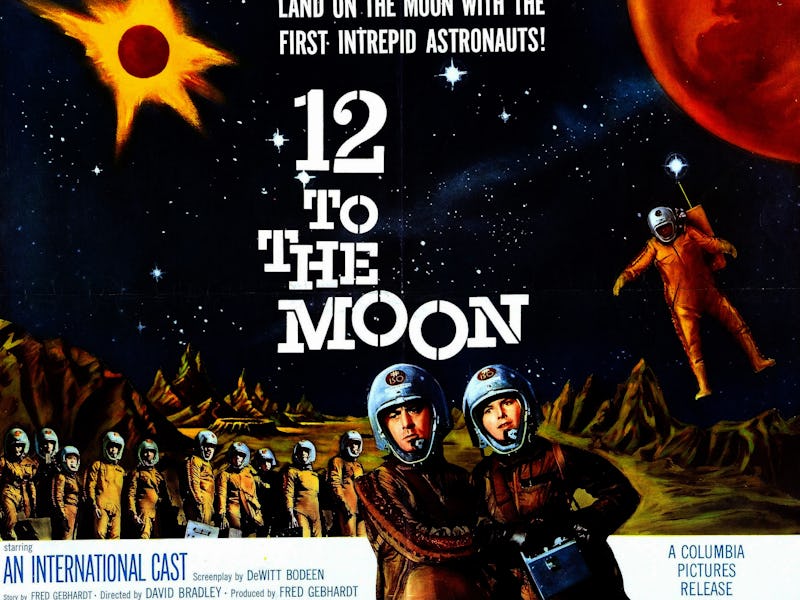How A Forgotten 1960s Sci-Fi Movie Took The Moon Landing International
Perhaps not the flashiest of Cold War sci-fi, 12 to the Moon certainly was ambitious.

Celebrating its 65th anniversary this month, 12 to the Moon might not be the flashiest sci-fi to have emerged during the Cold War, nor the most profound. Yet by inviting no fewer than 12 different nationalities to join its pioneering lunar expedition — including an American and a Russian — it tries to be the most politically diplomatic.
As spelled out in a handy who’s who opening scene, the governing International Space Body has selected astronauts from such unlikely territories as Nigeria, Poland, and Brazil to ensure the moon can’t be monopolized by a single nation. However, both the atypically crowded mission (for comparison, the 1967 first Apollo mission was manned by only three) and the film’s progressive intentions soon go awry: the former thanks to a treacherous Communist (surprisingly, not the most obvious candidate) and the latter a tendency to embrace tired old stereotypes.
Who could have guessed it would be the Swede (Anna-Lisa's Sigrid) that seems more interested in getting amorous than aeronautical, pouncing on Selim (Muzaffer Tema) the minute they set foot on the moon’s surface? Of course, it would be the chiseled and — as proven by a gratuitous shirtless scene — muscled All-American John (Ken Clark) who’s called upon to be the hero. And who else but the Japanese doctor Hideko (Michi Kobi) — one of only two women on board — would somehow be able to decipher the hieroglyphics which prove the moon isn’t uninhabited after all?
Finding characterization more difficult to navigate than outer space, 12 to the Moon also gives its United Nations-esque crew nothing to talk about other than their respective homelands. Feodor (Tom Conway) is introduced insisting that the USSR deserves sole credit for every major scientific development, while German Erich (John Wengraf) spends most of the mission wrestling with the guilt of his father’s Nazi past.
That said, the movie also subverts expectations throughout, too. It’s Frenchman Etienne (Roger Til), and not the Soviet, who proves to be the mission’s anti-American saboteur. In fact, it’s Feodor who stops him from carrying out the dastardly plan that would wipe out the USA, Canada, and Mexico in one fell swoop. And swerving the Minority Dies First trope, all non-white crew members end the movie with their lives intact.
No matter whether it’s improving or harming international relations, the film is always a deeply weird affair. Director David Bradley would later helm so-bad-it's-good cult classic They Saved Hitler’s Brain, and while 12 to the Moon is more competently made and performed — that's silent matinee idol Francis X. Bushman playing the portentous Secretary General — it does occasionally stray into Ed Wood territory.
Japan representative Hideko somehow perfectly translating a previously unknown language.
You can clearly see the “stars” shining through the rocketship, for instance, in the overused interstitial shot, suggesting the crew are traveling through deep space in a vehicle that’s entirely transparent. The seats they strap in on launch look suspiciously like garden furniture. And it tries to explain away the fact their helmets are missing visible protective visors by claiming they instead boast “invisible electromagnetic ray screens."
Further highlighting the bare-bones budget, 12 to the Moon is also an aliens movie without any aliens. Indeed, following Sigrid and Selim’s bizarrely-timed smooch, the lovebirds find themselves encased in an ice cave and held captive by an extraterrestrial race concerned their unwanted visitors will “contaminate our perfect form of harmony.”
Despite their increasing hostility — including plunging the whole of North America into a new Ice Age — we never see or hear from them directly. We do, however, learn they aren’t bound by the concept of emotions and that they’re highly intrigued by cats, demanding the two moggies from the Noah’s Ark-style menagerie on board be handed over, too.
The motley crew sporting their invisible electromagnetic ray screens.
If all this wasn’t weird enough, there’s the scene where William (Phillip Baird) slowly sinks to his death in quicksand, his colleagues’ minimal rescue effort turning what should be a moment of pure tragedy into an unintentional black comedy. Then the film also throws in the highly improbable twist that Erich’s father wiped out Israeli astronaut David’s (Richard Weber) entire family during the Holocaust. A heart-to-heart, conducted while the German is experiencing a heart attack, appears to iron out their differences remarkably quickly. By the end of the bonkers 74-minute caper, they’re happily joining each other in a volcanic suicide mission that will automatically thaw out every frozen human.
This self-sacrifice prompts the aliens to reconsider their previously derogatory opinions on human civilization and offer an open invitation for anyone who fancies braving their deathly hazardous home again. It’s a suitably nonsensical ending for a film which begins as a relatively grounded commentary on the space race but descends into the stuff of pure comic book fantasy. Still, you can’t help admire a sci-fi which, geopolitically speaking, at least tries to shoot for the stars.